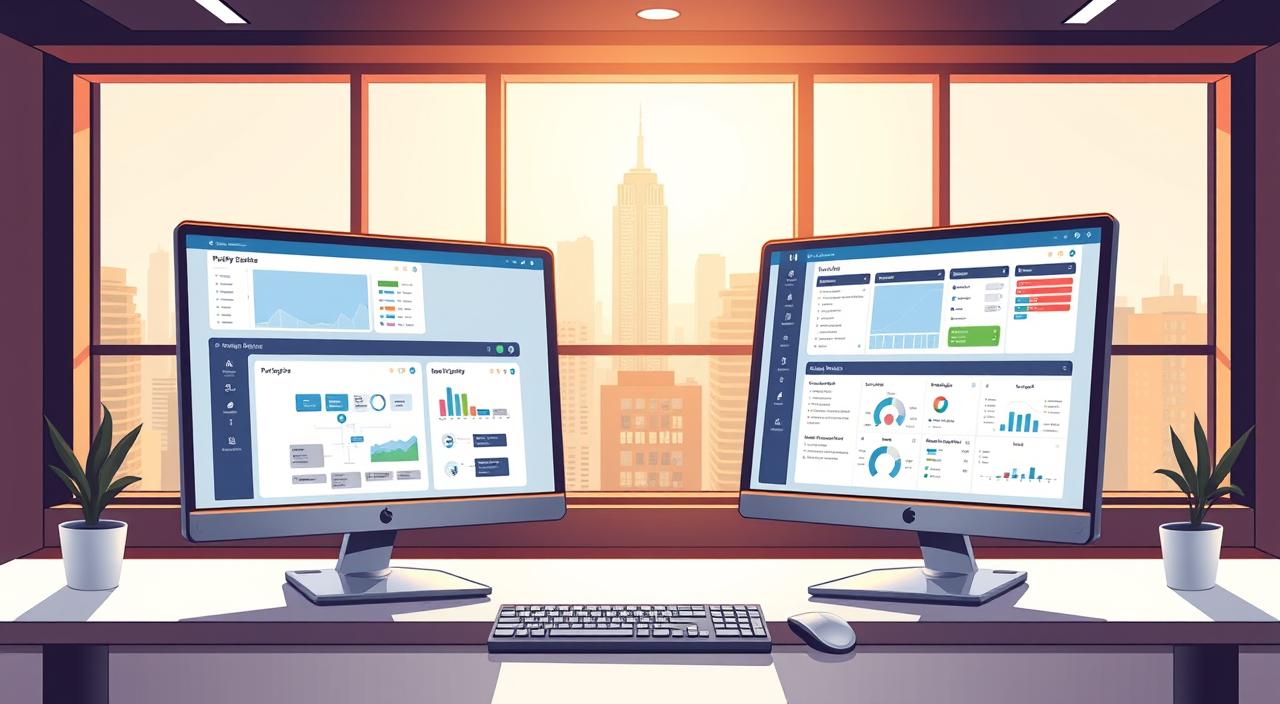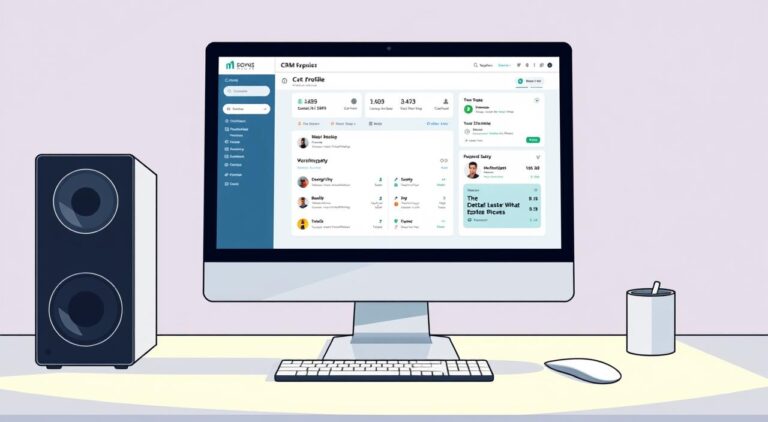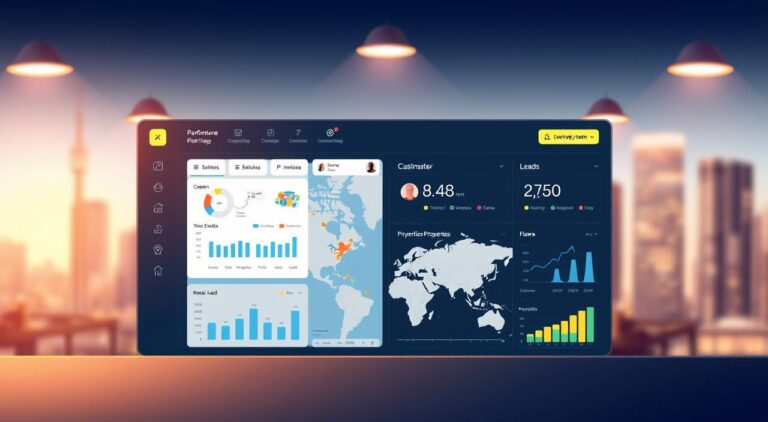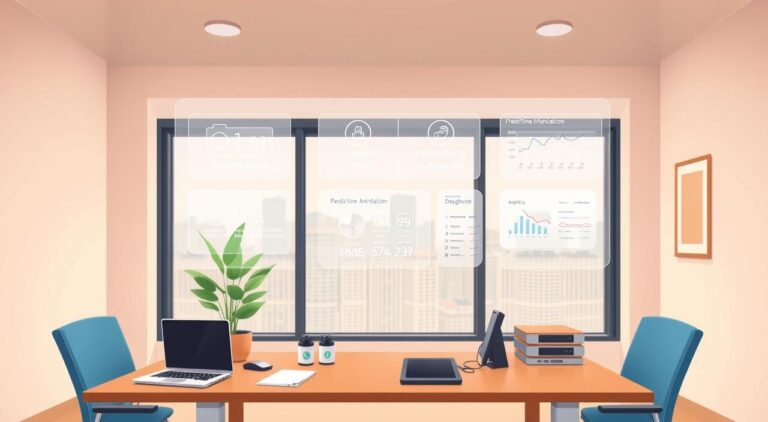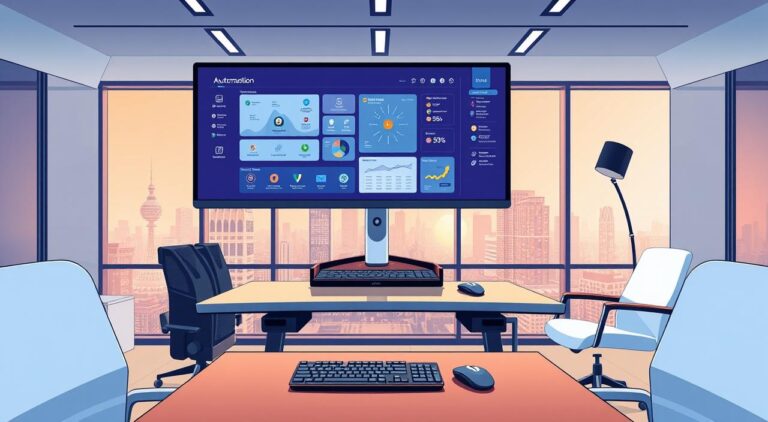Property Management Software vs Realty CRM: A Comparative Review
In the competitive real estate market, choosing the right digital tools is crucial for business efficiency and profitability. Two essential solutions are property management software and realty CRM systems, each serving distinct purposes.
Real estate professionals need to understand the differences between these tools to make informed decisions. While property management software focuses on operational aspects like rent collection and tenant management, realty CRM systems excel at sales pipeline management and client relationship development.
This comparative review will analyze the fundamental differences between these two solutions, helping you determine which one aligns best with your business needs.
Key Takeaways
- Understand the primary functions of property management software and realty CRM systems.
- Learn how to choose the right tool for your specific business needs.
- Discover the key features and benefits of each solution.
- Compare pricing models and integration capabilities.
- Explore real-world implementation scenarios for informed decision-making.
Understanding the Basics: Property Management Software and Realty CRM
The distinction between property management software and realty CRM lies at the heart of effective real estate business management. To make informed decisions, professionals must understand the unique functions and benefits of each.
What is Property Management Software?
Property management software is designed to streamline the day-to-day operations of property managers and landlords. It typically includes features such as rent collection, maintenance request management, and tenant screening.

What is Realty CRM?
Realty CRM (Customer Relationship Management) systems are specialized platforms designed specifically for real estate professionals to manage client relationships, track sales pipelines, and nurture leads throughout the property transaction process.

By understanding the core functionalities of both property management software and realty CRM, real estate professionals can better navigate the complex landscape of their industry and make more informed decisions about the tools they use.
The Evolution of Real Estate Technology Solutions
The evolution of real estate technology has been rapid, with innovative solutions transforming traditional practices. This transformation has been driven by the need for more efficient, data-driven, and customer-centric approaches in the real estate industry.
From Manual Processes to Digital Solutions
The shift from manual processes to digital solutions has been a hallmark of the real estate industry’s technological evolution. Property management software and realty CRM systems have emerged as critical tools, enabling businesses to streamline operations, enhance customer engagement, and make informed decisions based on data analysis.
The adoption of digital tools has not only improved operational efficiency but also enhanced the overall customer experience. For instance, online rental listings and electronic payments have simplified transactions, while resident portals have provided tenants with convenient access to various services.
Market Growth and Adoption Rates
The market for real estate technology solutions is experiencing significant growth, driven by increasing adoption rates across the industry. According to recent projections, the global real estate software market is expected to reach $17.13 billion by 2030, representing a compound annual growth rate of approximately 8.7%.
- Over two-thirds of property managers now utilize digital tools for core business functions, indicating a substantial shift towards technology-driven operations.
- Enterprise-level real estate firms have led the way in technology adoption, with 91% implementing comprehensive management software solutions.
- The trend is also evident among small to mid-sized property management companies, with a 64% adoption rate as of 2023.
Key Features of Property Management Software
The right property management software can significantly enhance operational efficiency for property managers.

Rent Collection and Financial Management
Effective property management software includes robust rent collection and financial management features. These tools enable property managers to track rent payments, manage accounts payable, and generate financial reports. According to industry experts, such as those at the National Apartment Association, digital financial management systems can reduce accounting errors by up to 30%.
Maintenance Request Management
Maintenance request management is another critical feature of property management software. This functionality allows tenants to submit maintenance requests online, which are then tracked and managed by the property management team. By streamlining maintenance requests, property managers can improve tenant satisfaction and reduce response times.
Tenant Screening and Lease Management
Comprehensive tenant screening and lease management capabilities are essential for property managers. These features help in evaluating potential tenants, creating legally binding leases, and managing lease renewals. Advanced software integrates with credit reporting services to facilitate thorough tenant screening.
Document Storage and Compliance
Document storage and compliance features are vital for maintaining organized records and adhering to regulatory requirements. Modern property management software offers secure cloud-based document storage systems that centralize all property-related documentation. These systems implement enterprise-grade security measures, including encryption and access controls, to protect sensitive information.
- Secure cloud-based document storage for leases, inspection reports, and compliance forms.
- Enterprise-grade security measures to protect sensitive tenant and property information.
- Compliance management features with customizable templates and automated notifications.
- Integration with electronic signature services like DocuSign and Adobe Sign.
According to the National Apartment Association, property management companies using digital document management systems report 42% fewer compliance-related issues during regulatory audits.
Essential Features of Realty CRM Systems

Real estate professionals are increasingly turning to Realty CRM systems to manage their client relationships, track leads, and optimize their sales processes. A robust Realty CRM system offers a multitude of features designed to enhance the efficiency and effectiveness of real estate businesses.
Lead Management and Nurturing
Effective lead management is crucial for real estate professionals. A Realty CRM system provides tools for capturing, tracking, and nurturing leads. By automating follow-up communications and lead scoring, these systems help agents prioritize their efforts on the most promising leads, thereby increasing conversion rates.
Sales Pipeline Tracking
Sales pipeline tracking is another vital feature of Realty CRM systems. It allows agents to visualize their sales process, from initial contact to closing deals. By monitoring the progress of leads through the sales pipeline, agents can identify bottlenecks, forecast sales performance, and make informed decisions to optimize their sales strategies.
Automated Communication Tools
Automated communication tools within Realty CRM systems enable real estate professionals to maintain consistent and timely interactions with their clients and leads. Whether it’s through email campaigns, SMS notifications, or social media updates, these tools help agents stay top of mind with their audience, fostering stronger relationships and improving client satisfaction.
MLS Integration and Listing Management
Advanced Realty CRM systems offer seamless integration with Multiple Listing Services (MLS), automatically importing property listings and synchronizing changes without requiring manual data entry. Key benefits include:
- Access to comprehensive property data directly within the CRM platform, including high-resolution images and detailed specifications.
- Automated listing alerts that match new MLS properties with client preferences stored in the CRM.
- Listing management tools that track property status changes and price adjustments across multiple MLS systems.
According to the National Association of Realtors, real estate professionals using MLS-integrated CRM systems report 37% faster response times to client inquiries and a 42% increase in the relevance of properties shared with prospects.
How Property Managers Utilize Management Software
Property managers are increasingly relying on management software to optimize their daily tasks and enhance tenant experiences. This software has become an indispensable tool in the property management industry, allowing managers to handle various tasks efficiently in one place.
Streamlining Day-to-Day Operations
Property management software significantly streamlines day-to-day operations by providing a centralized platform for managing maintenance requests, financial tasks, and communication with tenants. According to industry expert Joe Martin-Bindley, “After we assign priority to an issue, contractors deal directly with tenants. This allows us to work on the business rather than in it.” By automating routine tasks, property managers can focus on more critical aspects of their job, improving overall service quality.
Key benefits include:
- Centralized management of maintenance requests and tasks
- Automated financial management and rent collection
- Enhanced communication tools for better tenant engagement
Improving Tenant Relations and Satisfaction
The software also plays a crucial role in improving tenant relations and satisfaction. Resident portals provide tenants with 24/7 self-service access to submit maintenance requests, make payments, and communicate with management. As noted by the National Multifamily Housing Council, properties utilizing tenant-facing technology report 31% higher satisfaction scores and 24% improved renewal rates. By maintaining clear and consistent communication, property managers can create a more positive experience for tenants, leading to higher retention rates and improved overall satisfaction.
Effective communication is key to maintaining a positive relationship with tenants. The software enables property managers to keep tenants informed about important updates and events, fostering a sense of community and transparency.
How Real Estate Professionals Leverage CRM Systems
Real estate professionals are increasingly leveraging CRM systems to enhance their client relationships and sales performance. By utilizing these systems, agents can streamline their sales processes, improve client engagement, and ultimately drive business growth.
Managing Client Relationships and Leads
CRM systems enable real estate professionals to effectively manage their client relationships and leads through automated lead nurturing campaigns. These campaigns keep clients engaged by delivering market updates, alerts for new listings, and helpful educational content. According to industry experts, “Automated lead nurturing campaigns are a game-changer for real estate professionals, allowing them to stay top of mind with their clients and prospects.” Effective lead management is crucial in converting leads into clients.
Optimizing Sales Processes and Performance
CRM systems also optimize sales processes and performance by providing powerful analytics and reporting capabilities. These features enable professionals to identify their most productive lead sources, highest-converting marketing activities, and most profitable transaction types. As noted by the National Association of Realtors, agents utilizing CRM-driven performance analytics close an average of 26% more transactions annually than those without structured performance tracking systems. By leveraging these insights, real estate professionals can data-driven decisions to improve their sales strategies and enhance overall business results.
Furthermore, CRM systems streamline the sales process through automated workflow sequences, ensuring consistent client experiences and regulatory compliance. Time management features, such as automated appointment scheduling and task prioritization, help agents focus their limited time on high-value activities that directly impact revenue generation.
Property Management Software vs Realty CRM Review: Direct Comparison
When comparing property management software and realty CRM systems, it’s crucial to understand their core differences. Both are essential tools in the real estate industry, but they serve distinct purposes.
Core Functionality Differences
The primary distinction between property management software and realty CRM lies in their core functionalities. Property management software is designed to manage the day-to-day operations of rental properties, including rent collection, maintenance requests, and tenant screening. On the other hand, realty CRM systems focus on managing client relationships, leads, and sales pipelines.
- Property management software focuses on operational tasks such as rent collection and maintenance management.
- Realty CRM systems emphasize sales and client relationship management.
User Interface and Experience
The user interface and experience of property management software and realty CRM systems also differ significantly. Property management software typically features interfaces that are geared towards property managers, with dashboards focused on financial metrics, occupancy rates, and maintenance tasks. In contrast, realty CRM systems are designed for sales teams, with interfaces that highlight sales pipelines, lead sources, and client interactions.
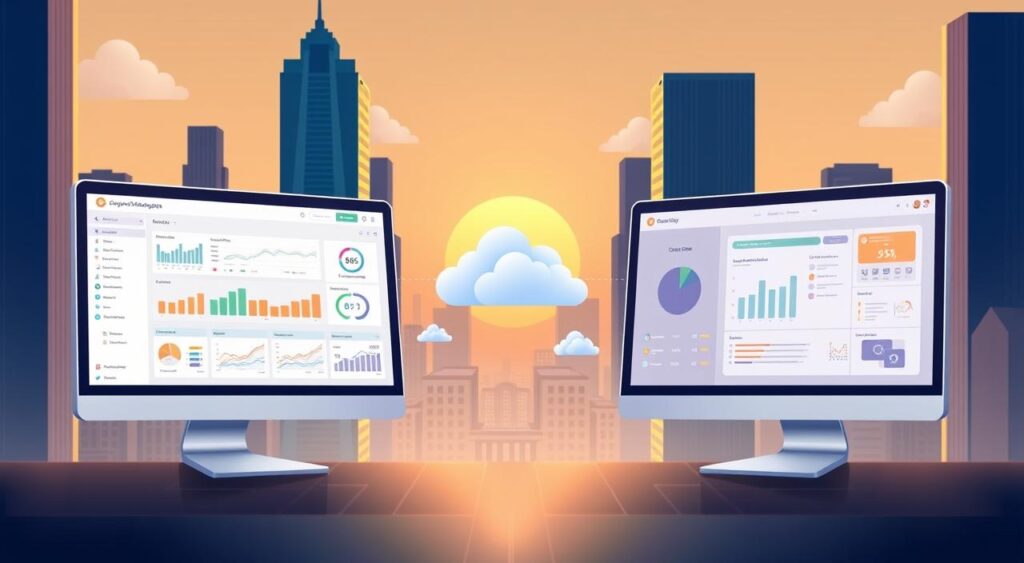
Reporting and Analytics Capabilities
One key distinction lies in reporting and analytics capabilities. CRMs focus on sales metrics like conversion rates and agent performance, while property management software zeroes in on operational data such as occupancy rates and maintenance expenses. According to Michael Beckerman, CEO of CREtech, “The analytical capabilities of these systems reflect their fundamental purpose – property management software helps you optimize what you own, while CRM systems help you grow what you control.”
- Property management software reporting capabilities focus on operational and financial metrics.
- Realty CRM systems emphasize sales performance analytics.
- Advanced systems in both categories now incorporate predictive analytics.
By understanding these differences, real estate professionals can choose the right tool for their needs, whether it’s optimizing property operations or growing their sales pipeline.
Integration Capabilities and Ecosystem Considerations
As real estate businesses continue to evolve, the importance of integrating property management software with realty CRM systems cannot be overstated. This integration is crucial for creating a seamless and efficient operational ecosystem.
The integration of property management software with realty CRM systems allows for the creation of a unified platform that streamlines real estate operations. By connecting these systems, businesses can eliminate redundant data entry, reduce information silos, and enhance overall efficiency.
Compatible Systems and Add-ons
When evaluating property management software and realty CRM systems, it’s essential to consider their compatibility with other systems and add-ons. Many modern solutions offer integration with popular accounting software, marketing tools, and other relevant platforms, creating a comprehensive ecosystem that supports diverse business needs.
Benefits of Integrated Solutions
Integrated solutions provide numerous benefits, including enhanced data consistency and improved business intelligence. By connecting property management and CRM systems, real estate professionals can gain a holistic view of their operations, from lead generation to property management. This integrated approach enables more informed strategic decisions and drives business growth.
For instance, Narellan & Districts Property Management reported a 20% boost in efficiency after integrating their CRM system with their property management software. Such integrations not only streamline operations but also open up new opportunities for growth and improved customer satisfaction.
Pricing Models and Cost Considerations
To effectively budget, real estate professionals must comprehend the various pricing structures associated with property management software and Realty CRM solutions. This understanding is crucial for making informed decisions that align with business needs and financial capabilities.

Typical Pricing Structures for Property Management Software
Property management software often employs pricing models that are based on the number of units or properties managed. This can include tiered pricing structures where costs decrease as the number of units increases. Some providers may charge a flat monthly fee, while others may charge a percentage of the monthly rent collected.
Additional costs may include setup fees, training costs, and charges for additional services such as online payment processing or custom reporting. According to industry experts, it’s essential to evaluate these costs comprehensively to understand the total cost of ownership.
Common Pricing Models for Realty CRM Systems
Realty CRM systems typically employ user-based pricing models, where costs are calculated per agent or user. Industry-standard rates range from $25 to $100 per user per month, depending on the feature sophistication and brand positioning. Renowned real estate coach Tom Ferry emphasizes that “The right CRM is never about finding the cheapest option, but rather identifying the platform that delivers the highest return on investment through improved conversion rates and time savings.”
Many leading providers offer tiered subscription plans with escalating feature sets, allowing real estate professionals to start with basic functionality and upgrade as their business grows or needs evolve. Enterprise-level solutions for larger brokerages often employ custom pricing models based on total user count, required features, implementation services, and ongoing support needs.
When evaluating Realty CRM pricing, consider additional cost considerations such as onboarding fees, data migration expenses, integration costs with other platforms, and charges for premium features like automated marketing campaigns or advanced analytics that may require separate subscription fees.
Case Study: When to Choose Property Management Software
Effective property management requires the right tools, andproperty management softwareis often the key to unlocking operational efficiency. By automating tasks and streamlining workflows, property managers can focus on growing their business and improving tenant satisfaction.
Ideal Business Profiles and Use Cases
Property management software is particularly beneficial for companies managing large portfolios or complex rental properties. For instance,Cornerstone Property Management, a mid-sized firm, implementedAppFolio Property Managerand reported a 42% reduction in administrative workload while increasing their portfolio by 30% without adding staff. Ideal candidates for property management software include property managers handling multiple units, rental properties, or those with high maintenance demands.
Success Stories and Implementation Examples
Several property management companies have achieved significant success by implementing specialized software.Mountain West Real Estate, specializing in vacation rental management, adoptedGuesty property management softwareand documented a 68% decrease in maintenance response times and a 47% improvement in guest satisfaction scores within six months. According toReal-Time Consulting Services, their clients typically experience 35-40% reductions in administrative tasks through workflow automation and integrated communication tools. By leveraging property management software, companies can redirect resources toward growth initiatives, allocating 15-20 more hours weekly to business development activities.
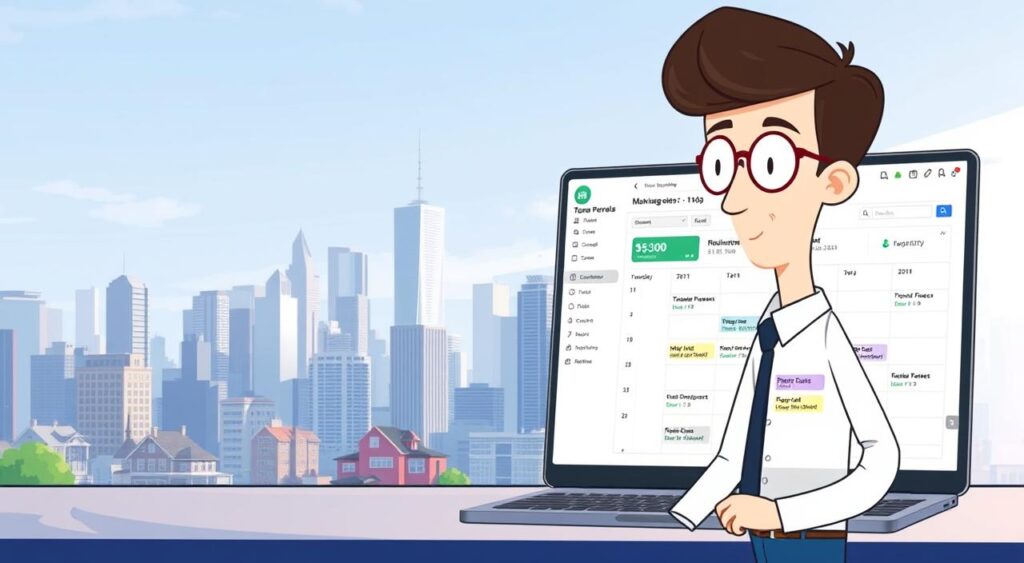
Case Study: When to Choose Realty CRM
In the competitive world of real estate, leveraging a robust CRM can be the key to improving lead conversion rates and overall business growth. Realty CRM systems are designed to help real estate professionals manage their client relationships, track leads, and optimize sales processes more effectively.
Ideal Business Profiles and Use Cases
Realty CRM is particularly beneficial for real estate businesses that focus on sales and client relationships. Brokerages, real estate agents, and property developers can significantly enhance their operations by implementing a CRM system tailored to their needs. For instance, a mid-sized brokerage with multiple agents can use a Realty CRM to streamline lead distribution, track client interactions, and analyze sales performance.
The ideal use cases include businesses looking to improve their lead management efficiency, enhance client engagement, and reduce sales cycles. By adopting a Realty CRM, these businesses can experience significant improvements in their overall sales performance and client satisfaction.
Success Stories and Implementation Examples
Several real estate businesses have achieved remarkable results by implementing Realty CRM systems. For example, Coldwell Banker Premier, a mid-sized brokerage, documented a 37% increase in lead conversion rates and a 28% growth in transaction volume within the first year of adopting Follow Up Boss CRM. Similarly, luxury real estate team Madison & Company reported a 52% improvement in lead response times, resulting in 23 additional transactions valued at $14.2 million.
Other success stories include CasaGrand Properties, who attributed 50% of their 400 monthly bookings directly to improved lead management through their CRM implementation. According to Real Estate Webmasters, brokerages adopting comprehensive CRM solutions typically experience 30-45% improvements in lead management efficiency, enabling agents to handle larger prospect volumes without sacrificing service quality.
These case studies demonstrate the substantial impact that a well-implemented Realty CRM can have on a real estate business, from enhancing lead conversion rates to improving overall sales performance.
Making the Right Choice: Decision Framework
With numerous options available, deciding on the most suitable software for your real estate business can be challenging. As your business grows, you may find value in using both property management software and Realty CRM. Many real estate professionals start with a CRM to build their client base, then add property management tools as they expand into rental properties.
Assessing Your Business Needs and Priorities
To make an informed decision, it’s crucial to assess your business needs and priorities. Consider the key features that are essential for your operations, such as rent collection, maintenance request management, and lead tracking. Evaluate the importance of reporting and analytics capabilities in your software.
Evaluating Team Size and Transaction Volume
Your team size and transaction volume play a significant role in determining the right software for your business. Consider the scalability of the platform and its ability to handle increased transaction volumes or growing team sizes. According to Brad Inman, founder of Inman News and real estate technology expert, “The most expensive software decision is often the one that requires replacement after just a year or two because it couldn’t scale with your business growth.”
“The most expensive software decision is often the one that requires replacement after just a year or two because it couldn’t scale with your business growth.” – Brad Inman
Considering Future Growth and Scalability
Forward-thinking real estate organizations should select software platforms that accommodate projected growth over a 3-5 year horizon. Scalability considerations should include technical factors like database capacity and performance under increased load, as well as business factors like pricing structures that remain economical as volume increases. The National Association of Residential Property Managers recommends evaluating not just current software capabilities but also the provider’s product roadmap and history of innovation.
- Choose software that meets your immediate needs but also offers room for future growth.
- Consider the provider’s product roadmap and history of innovation.
- Evaluate the scalability of the platform and its ability to handle increased transaction volumes or growing team sizes.
Conclusion
This comprehensive review of property management software vs realty CRM reveals that both systems serve essential purposes in the real estate technology ecosystem. The optimal choice between them depends primarily on your business focus and operational requirements.
Property management software is ideal for organizations focused on operational efficiency in managing rental properties, streamlining tasks such as maintenance tracking, rent collection, and financial reporting. On the other hand, realty CRM systems are better suited for businesses that prioritize sales activities, lead nurturing, and client relationship management throughout the property buying and selling process.
Many growing real estate organizations find that implementing both systems creates powerful synergies. By integrating real estate sales CRM with property management software, businesses can improve communication, simplify processes, and boost efficiency. As noted by MRI Software in February 2024, such integration enhances overall workflow.
- The choice between property management software and realty CRM depends on your business needs and operational requirements.
- Combining both systems can create seamless workflows across the entire property lifecycle, from acquisition through management and eventual disposition.
- Forward-thinking real estate professionals should regularly reassess their software stack to ensure alignment with changing business needs and industry trends.
In conclusion, understanding the distinct functions and benefits of property management software and realty CRM is crucial for making informed decisions in today’s competitive real estate market. By choosing the right system or integrating both, businesses can enhance their operations, improve client relationships, and drive growth.
